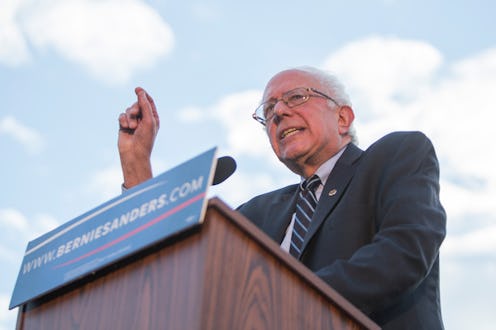News
Bernie Sanders Is An Intersectional Feminist
The issue of total equality is a major one when it comes to deciding which presidential candidate can further progress in this country, especially for underserved populations like women and people of color. Democratic presidential candidate Hillary Clinton has repeatedly stated that she's a feminist. Republican candidate Carly Fiorina has indicated she'd like to redefine feminism, though her version is debatable. After months of staying mum, Bernie Sanders finally came out as a feminist in September, an unsurprising move given his voting record. But perhaps more importantly, we should call Bernie Sanders an intersectional feminist because of his fight for the rights of women of color as well as women in the LGBTQ community.
His consistency in advocating for equality is what has drawn many fellow feminists to support Sanders. Already, a grassroots effort has sprouted for women to rally behind the Democratic presidential hopeful. Women for Bernie organizer Jenni Siri tells The Washington Post that it's Sanders' far-reaching policies and efforts that have drawn her and thousands of other women to support the Vermont senator. Siri said:
Hillary's just not the right woman to do it. She's OK on health care, OK on some liberal issues. Bernie's policies just go farther and are all-around better.
Sanders has consistently championed LGBT rights, calling the issue a "human rights" one. According to his website, the Vermont senator has been an avid supporter of gay rights since first taking political office as the mayor of Burlington in 1981. Just two years after taking office, Sanders was participating in the town's gay pride parade. As he ascended toward even higher office, the Vermont politician consistently voted in favor of equality.
He voted against the Defense of Marriage Act as well as "Don't Ask, Don't Tell" while serving in the House of Representatives. Now that he's running for president, Sanders has outlined a seven-point plan he will implement if he's elected that includes bridging the inequality gap. Sanders' policies include:
- Sweeping anti-discrimination legislation that allows students as well as adults protection in addition to providing resources meant to reduce suicide rate in such a vulnerable population.
- Preventing financial institutions from discriminating against customers based on their sexual orientation or gender presentation.
- Educating police officers and departments on how to best interact with the LGBT community.
- Vetoing discriminatory "religious freedom" legislation.
Three years after riding in the Burlington gay pride parade, Sanders pushed toward comprehensive reform of affordable housing that would ultimately culminate in the building being owned by its residents today. Likewise, the city's largest grocery store as well as its power company are all owned by the public. This gives even the most underserved a chance to have their voices heard and a literal stake in important resources. Sanders consistently saw how important representation was and established such posts as a youth office as well as a women's council. Under the women's council, an ordinance was successfully passed requiring that construction jobs funded by Burlington be composed of at least 10 percent women workers.
His tenure as Vermont's sole house representative was just as impressive for inclusionary legislation, especially when it came to women's reproductive rights. Sanders has a 100 percent rating from NARAL and has consistently championed the right to choose, co-sponsoring the Freedom of Choice Act of 1993, which is still awaiting further action. If it passes, the bill would essentially ban states from enacting restrictions on abortions. This is an issue that is especially intersectional, as women of color are at a higher risk of terminating pregnancies. Black women are five times more likely to have an abortion than white women, according to the Centers for Disease Control and Prevention, and Latinas are twice as more likely. Income inequality is also a contributing factor and Sanders has consistently advocated for the widespread availability of contraceptives, co-sponsoring bills that provide access as well as funding.
In a multi-faceted plan to address racial injustice, Sanders specifically touched upon economic violence. He cites the statistic that black women earn just 64 cents compared to white men. That number only slightly increases to 78 cents for Latina women. Sanders has repeatedly called for equal pay, once again highlighting the point in a 2014 comprehensive financial plan he unveiled while serving as senator. Sanders also voted in favor of the Lilly Ledbetter Fair Pay Act of 2009 and even briefly touched upon the issue in his first campaign ad, released Nov. 1.
Though consistently vocal about women's rights, Sanders was criticized over his lack of addressing pressing black issues such as the Black Lives Matter movement. He has since met with activists, released the aforementioned racial justice plan, and has stayed committed to the ongoing dialogues addressing inequality across the country. Sanders' willingness to work with organizers all goes back to his roots in politics in Burlington, where grassroots efforts and cooperation were key. His intersectional feminism will undoubtedly continue to be highlighted as his campaign progresses.
